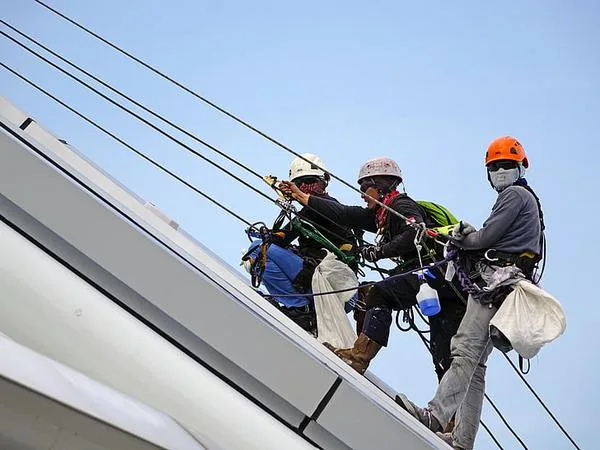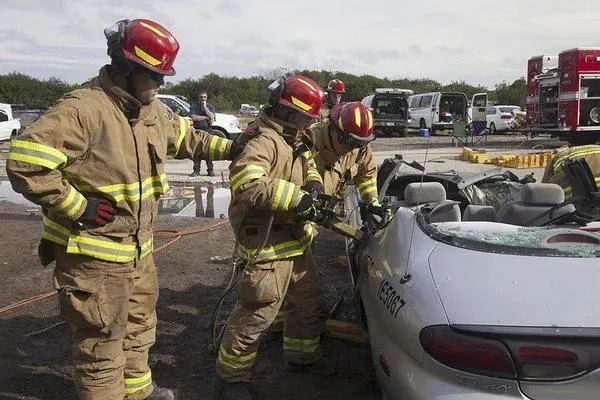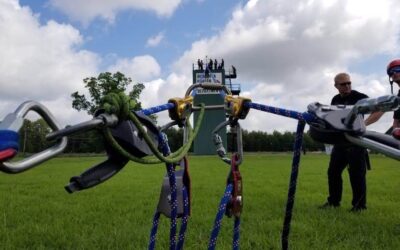Unlocking the Power of Safety
Welcome to the world of industrial rescue, where safety and readiness are not just buzzwords but the very essence of what we do at RNR Services. At RNR Services, we are your trusted partner, offering innovative rescue solutions and comprehensive industrial rescue training to ensure safety and success in high-risk industries. In this article, we will explore the vital role that training plays in industrial rescue, highlighting its impact on safety standards and the development of essential skills for industrial rescue teams.
The industries we serve face unique challenges and risks that demand a proactive approach to safety and emergency response. Industrial sites are rife with potential hazards, and unforeseen situations can quickly escalate into life-threatening emergencies. It’s in these critical moments that the significance of proper industrial rescue training becomes abundantly clear.
Join us as we delve into the life-saving impact of industrial rescue, the role of training in ensuring safety and preparedness, and how RNR Services stands as your beacon of expertise and guidance in this realm. Let’s embark on a journey that underscores the importance of well-prepared industrial rescue teams, adherence to safety standards, and the acquisition of the essential skills that can mean the difference between life and tragedy.
Certainly, let’s write the section titled “The Life-Saving Impact of Industrial Rescue” based on the bullets I provided in the outline. I’ll include some consistent statistics to emphasize the importance of industrial rescue.
- The Life-Saving Impact of Industrial Rescue
- The Role of Proper Training
- RNR Services: Your Partner in Industrial Rescue Training
- The Key Components of Effective Industrial Rescue Training
- Compliance and Regulations
- Benefits of Investing in Industrial Rescue Training
- Charting a Safer Future with RNR Services
The Life-Saving Impact of Industrial Rescue
Industrial rescue is more than just a job; it’s a mission to protect and save lives. At RNR Services, we understand the profound significance of well-executed industrial rescue operations, and we’re here to shed light on the critical role it plays in various high-risk industries. To illustrate its importance, let’s delve into some compelling statistics that highlight the life-saving impact of industrial rescue:
According to the U.S. Bureau of Labor Statistics, there were over 5,000 fatal work injuries in the United States in 2019. A significant number of these incidents required emergency response and rescue efforts to mitigate the consequences.
The National Fire Protection Association (NFPA) reported that from 2013 to 2017, there were an estimated 34,900 non-fire emergencies, including hazardous material incidents and technical rescues, each year. Properly trained industrial rescue teams are essential for managing such incidents safely.
These statistics underscore the undeniable truth: industrial rescue teams are the unsung heroes of high-risk industries. They are the first responders when disaster strikes, and their proficiency can be the difference between life and death. Ensuring that these teams receive proper training and have access to the right equipment is paramount, and that’s where RNR Services comes into play. We provide innovative rescue solutions and comprehensive training programs to equip industrial rescue teams with the skills and knowledge needed to save lives and ensure the safety of all those on the frontlines.
The Role of Proper Training
Proper training is the cornerstone of effective industrial rescue operations. Without the right knowledge, skills, and preparation, industrial rescue can quickly turn into a high-stakes gamble. In this section, we will delve into the critical importance of training for industrial rescue operations and its role in maintaining safety standards and developing essential skills for industrial rescue teams.
- Essential Skills for Industrial Rescue: Industrial rescue requires a unique set of skills that encompass technical expertise, quick decision-making, and the ability to remain composed under pressure. Well-trained teams are equipped with these essential skills, including:
- Technical Proficiency: Industrial rescue teams are trained to handle various rescue equipment, including harnesses, ropes, and communication tools, ensuring that they can respond effectively to a wide range of emergency situations.
- Problem Solving: Training equips teams with problem-solving skills, enabling them to assess complex rescue scenarios and devise effective strategies for safe extrication.
- Communication: Effective communication is paramount during rescue operations. Proper training ensures that teams can coordinate seamlessly, conveying critical information and instructions to one another.
- Risk Mitigation and Safety Standards: Industrial environments are fraught with potential hazards, from confined spaces to hazardous materials. Proper training is essential for identifying and mitigating risks effectively. It also ensures compliance with safety standards and regulations, including OSHA standards in the United States. Failure to adhere to these safety standards can lead to accidents, injuries, and fatalities, making training a crucial factor in maintaining a safe work environment.
- Quick and Coordinated Response: In emergency situations, time is of the essence. Well-trained industrial rescue teams can respond quickly and efficiently, reducing the time it takes to reach and assist a victim. This rapid response can be the difference between life and tragedy.
- Confidence and Readiness: Training instills confidence in rescue team members. Knowing that they are well-prepared and have honed their skills, they can approach any situation with the readiness required to save lives.
- Adaptability: Industrial rescue teams often encounter unexpected challenges. Proper training ensures that they can adapt to evolving circumstances, making quick decisions and adjustments as needed.
In other words, the role of proper training in industrial rescue cannot be overstated. It equips teams with the essential skills they need, helps maintain safety standards, ensures a rapid and coordinated response, fosters confidence, and enhances adaptability in the face of unexpected challenges. At RNR Services, we are dedicated to providing comprehensive training programs that empower industrial rescue teams with the knowledge and skills necessary to excel in their life-saving mission. Through training, we not only save lives but also ensure the safety and well-being of those who work in high-risk environments.
RNR Services: Your Partner in Industrial Rescue Training
At RNR Services, we are committed to equipping industrial rescue teams with the knowledge, skills, and expertise they need to excel in their life-saving mission. Our comprehensive training programs are designed to meet the ever-evolving demands of high-risk industries. While we offer a wide range of training programs, here, we’ll highlight some of our key offerings that are essential for industrial rescue teams.
1. Rope Rescue/Confined Space Rescue Technician:
Course Description: Our Rope Rescue/Confined Space Rescue Technician course is a flagship program that prepares individuals and teams to apply advanced techniques in low-angle, high-angle, and confined space environments. This course is meticulously designed to meet the rigorous standards set by NFPA 1006 (2017) Technician-level, as well as the standards defined in Chapters 5 & 7 of NFPA 2500 (2022) Operations-level Standard on Operations and Training for Technical Search and Rescue Incidents.
2. Emergency Medical Rescue Tactics (EMRT):
Course Description: In emergencies, every second counts. Our Emergency Medical Rescue Tactics (EMRT) course provides imperative actions to take before EMS arrives. It goes beyond basic first aid, empowering individuals and team rescuers with the knowledge and skills needed to save lives. These significant, imperative, need-to-know actions fill the gap between hands-on rescue and the arrival of emergency personnel. This course is suitable for both individuals and team rescuers.
3. Rope Access Awareness:
Course Description: Our Rope Access Awareness course is designed for technically trained rescuers seeking to expand their skill set. This program provides awareness-level information and basic rope access skills. Upon completion, participants will be equipped to conduct risk analyses at rope access job sites, assist rope access teams in rescue operations, and perform safety inspections. Hands-on training covers essential rope access skills, including ascending, descending, changeovers, and rope-to-rope transfers.
We offer a comprehensive range of courses tailored to the specific needs of your industrial rescue teams. When you choose RNR Services as your training partner, you gain access to a wealth of expertise and resources dedicated to ensuring the safety and preparedness of your teams. We are here to empower you with the skills and knowledge needed to navigate the unique challenges of high-risk environments and save lives.

The Key Components of Effective Industrial Rescue Training
Industrial rescue training is not a passive endeavor; it requires an active, hands-on approach to prepare rescue teams for the challenges they may face in high-risk environments. Effective training programs must incorporate key components that provide trainees with practical experience and the ability to respond confidently in real-life scenarios. Among these crucial components, three stand out: hands-on exercises, simulations, and realistic scenarios.
- Hands-On Exercises: Hands-on exercises are the backbone of industrial rescue training. They offer trainees the opportunity to put theoretical knowledge into practical use. Here’s why they are essential:
- Skill Development: Hands-on exercises allow participants to develop critical skills. Whether it’s handling rescue equipment, setting up rigging systems, or performing patient care, practical experience is invaluable. The tactile nature of hands-on training helps individuals build muscle memory and confidence.
- Team Coordination: Industrial rescue often involves collaborative efforts. Hands-on exercises provide an ideal environment for team members to work together, enhancing communication, coordination, and trust. These skills are vital during high-pressure rescue operations.
- Confidence Building: Success in training exercises boosts participants’ confidence. The more confident a rescue team is, the more effectively they can respond to real-life emergencies.
- Simulations: Simulations recreate complex scenarios in a controlled environment, allowing trainees to experience a wide range of challenges without the risks associated with actual incidents. The significance of simulations in industrial rescue training is evident in the following ways:
- Realism and Immersion: Simulations can replicate the look, feel, and challenges of an industrial rescue scenario. This realism immerses trainees in a lifelike situation, helping them understand the gravity of their roles and responsibilities.
- Decision-Making Practice: Simulations present trainees with decisions they must make on the spot. This encourages them to think critically, prioritize tasks, and respond appropriately. The decision-making skills honed in simulations are transferable to real emergencies.
- Error Identification and Correction: Mistakes made in a simulation are opportunities for learning. Trainees can identify errors, understand their consequences, and correct them in a safe environment. This iterative process is invaluable for improvement.
- Realistic Scenarios: Effective industrial rescue training goes beyond textbook scenarios; it incorporates realistic challenges encountered in actual work settings. Here’s why realistic scenarios matter:
- Contextual Learning: Trainees benefit from training that mirrors their work environment. Realistic scenarios help them understand the specific challenges and intricacies they will face on the job.
- Stress Inoculation: Realistic scenarios introduce stress, pressure, and urgency—conditions that often characterize industrial rescue situations. Exposure to these stressors during training helps participants acclimate to them and perform effectively under pressure.
- Adaptability and Creativity: In the real world, emergencies seldom follow a script. Realistic scenarios encourage trainees to adapt and think creatively to overcome unforeseen obstacles. This adaptability is a valuable skill in dynamic rescue operations.

Compliance and Regulations
At RNR Services, we take compliance with industry-specific regulations and safety standards seriously. Our industrial rescue training programs are meticulously crafted to align with, and often exceed, the requirements set forth by prominent regulatory bodies such as the National Fire Protection Association (NFPA) 1670 and the Occupational Safety and Health Administration (OSHA) 1910.146.
Our commitment to these regulations means that when you choose RNR Services for your industrial rescue training, you are selecting a partner dedicated to ensuring that your teams are fully equipped to meet or exceed the compliance standards mandated by the NFPA and OSHA. This, in turn, promotes the safety, preparedness, and efficiency of your industrial rescue operations.
Benefits of Investing in Industrial Rescue Training
Investing in industrial rescue training yields a range of benefits for companies and their employees. Beyond the paramount goals of safety and emergency response readiness, there are two additional significant advantages.
- Improved Workplace Productivity: Well-trained industrial rescue teams are more proficient in handling emergency situations efficiently. This translates into reduced downtime and interruptions to work processes, ultimately contributing to improved workplace productivity.
- Enhanced Reputation and Client Trust: Demonstrating a commitment to safety through robust industrial rescue training not only safeguards your employees but also enhances your company’s reputation. Clients and partners value organizations that prioritize safety, fostering trust and long-term relationships.
While the primary objective is to enhance safety and emergency response, the advantages extend to financial benefits as well. Well-prepared industrial rescue teams are not only more adept at ensuring the well-being of personnel but also at reducing accident-related costs. Fewer accidents, injuries, and fatalities translate into lower workers’ compensation claims, medical expenses, and potential legal liabilities. By prioritizing comprehensive training, companies can realize substantial long-term savings and protect their most valuable assets—their employees.
Charting a Safer Future with RNR Services
In the world of high-risk industries, the role of industrial rescue is paramount. Ensuring the safety and well-being of personnel is a mission that requires dedication, preparation, and the right training. At RNR Services, we stand as your unwavering partner in this mission, offering innovative rescue solutions and comprehensive training programs designed to meet the demands of the most challenging environments.
Through our commitment to excellence, alignment with industry regulations such as NFPA 1670 and OSHA 1910.146, and an emphasis on hands-on training, simulations, and realistic scenarios, we empower industrial rescue teams to excel in their life-saving roles. By investing in our training, you not only prioritize the safety of your teams but also unlock financial benefits, improved productivity, and a stronger reputation in the industry.
Choosing RNR Services means choosing a partner dedicated to your success, the safety of your teams, and the well-being of your organization. We invite you to explore our training programs and the full spectrum of our innovative rescue solutions, knowing that we are here to support your journey towards safety, preparedness, and the ultimate goal: saving lives.
For a deeper understanding of how RNR Services can empower your organization with top-tier industrial rescue training and solutions, we encourage you to get in touch. Explore our success stories, discover the full scope of our training programs, and learn how we can work together to enhance safety, preparedness, and the effectiveness of your industrial rescue teams. Your journey towards a safer workplace starts with RNR Services – your trusted partner in industrial rescue excellence.
